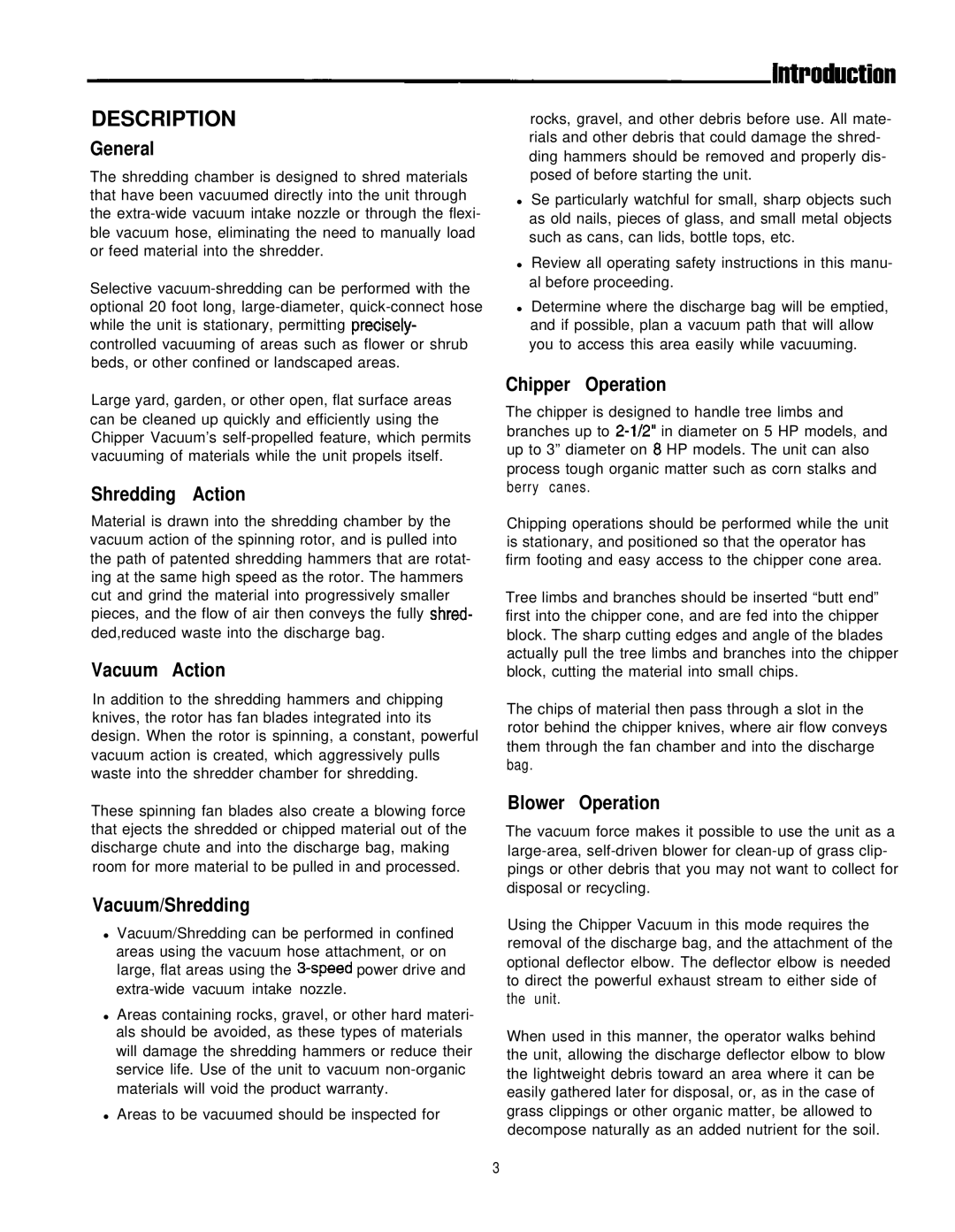
DESCRIPTION
General
The shredding chamber is designed to shred materials that have been vacuumed directly into the unit through the
Selective
Large yard, garden, or other open, flat surface areas can be cleaned up quickly and efficiently using the Chipper Vacuum’s
Shredding Action
Material is drawn into the shredding chamber by the vacuum action of the spinning rotor, and is pulled into the path of patented shredding hammers that are rotat- ing at the same high speed as the rotor. The hammers cut and grind the material into progressively smaller pieces, and the flow of air then conveys the fully shred- ded,reduced waste into the discharge bag.
Vacuum Action
In addition to the shredding hammers and chipping knives, the rotor has fan blades integrated into its design. When the rotor is spinning, a constant, powerful vacuum action is created, which aggressively pulls waste into the shredder chamber for shredding.
These spinning fan blades also create a blowing force that ejects the shredded or chipped material out of the discharge chute and into the discharge bag, making room for more material to be pulled in and processed.
Vacuum/Shredding
•Vacuum/Shredding can be performed in confined areas using the vacuum hose attachment, or on large, flat areas using the
•Areas containing rocks, gravel, or other hard materi- als should be avoided, as these types of materials will damage the shredding hammers or reduce their service life. Use of the unit to vacuum
•Areas to be vacuumed should be inspected for
rocks, gravel, and other debris before use. All mate- rials and other debris that could damage the shred- ding hammers should be removed and properly dis- posed of before starting the unit.
•Se particularly watchful for small, sharp objects such as old nails, pieces of glass, and small metal objects such as cans, can lids, bottle tops, etc.
•Review all operating safety instructions in this manu- al before proceeding.
•Determine where the discharge bag will be emptied, and if possible, plan a vacuum path that will allow you to access this area easily while vacuuming.
Chipper Operation
The chipper is designed to handle tree limbs and branches up to
Chipping operations should be performed while the unit is stationary, and positioned so that the operator has firm footing and easy access to the chipper cone area.
Tree limbs and branches should be inserted “butt end” first into the chipper cone, and are fed into the chipper block. The sharp cutting edges and angle of the blades actually pull the tree limbs and branches into the chipper block, cutting the material into small chips.
The chips of material then pass through a slot in the rotor behind the chipper knives, where air flow conveys them through the fan chamber and into the discharge bag.
Blower Operation
The vacuum force makes it possible to use the unit as a
Using the Chipper Vacuum in this mode requires the removal of the discharge bag, and the attachment of the optional deflector elbow. The deflector elbow is needed to direct the powerful exhaust stream to either side of the unit.
When used in this manner, the operator walks behind the unit, allowing the discharge deflector elbow to blow the lightweight debris toward an area where it can be easily gathered later for disposal, or, as in the case of grass clippings or other organic matter, be allowed to decompose naturally as an added nutrient for the soil.
3
